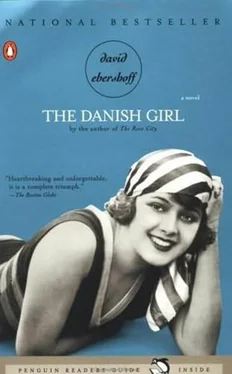“Not even for a few minutes?” she asked. “I need to paint the hem against her knees.” Greta was sitting on the rope-bottom chair beside him, stroking Einar’s calf through the silk. Her hand was hypnotic, its touch telling him to close his eyes. He could hear nothing but the little rough scratch of her fingernail against the silk.
But then Greta stopped. “No, I’m sorry,” she said. “I shouldn’t have asked.”
Now Einar saw that the door to the pickled-ash wardrobe was open, and hanging inside was Anna’s dress. It was white, with drop beads along the knee-hem and the cuff. A window was cracked, and the dress was swaying gently on the hanger. There was something about the dress-about the dull sheen of its silk, about the bib of lace in the bodice, about the hook-buttons on the cuffs, unlatched and split apart like little mouths-that made Einar want to touch it.
“Do you like it?” Greta asked.
He thought about saying no, but that would have been a lie. He liked the dress, and he could nearly feel the flesh beneath his skin ripening.
“Then just slip it on for a few minutes.” Greta brought it to Einar and held it to his chest.
“Greta,” he said, “what if I-”
“Just take off your shirt,” she said.
And he did.
“What if I-”
“Just close your eyes,” she said.
And he did.
Even with his eyes closed, standing shirtless in front of his wife felt obscene. It felt as if she’d caught him doing something he had promised he would avoid-not like adultery, but more like resuming a bad habit he’d given his word he would quit, like drinking aquavit in the canal bars of Christianshavn or eating frikadeller in bed or shuffling through the deck of suede-backed girlie cards he once bought on a lonely afternoon.
“And your trousers,” Greta said. Her hand reached out, and she politely turned her head. The bedroom window was open, and the brisk fishy air was pimpling his skin.
Einar quickly pulled the dress over his head, adjusting the lap. He was sweating in the pits of his arms, in the small of his back. The heat was making him wish he could close his eyes and return to the days when he was a boy and what dangled between his legs was as small and useless as a white radish.
Greta only said, “Good.” Then she lifted her brush to the canvas. Her blue eyes narrowed, as if examining something on the point of her nose.
A strange watery feeling was filling Einar as he stood on the lacquer trunk, the sunlight moving across him, the scent of herring in the air. The dress was loose everywhere except in the sleeves, and he felt warm and submerged, as if dipping into a summer sea. The fox was chasing the mouse, and there was a distant voice in his head: the soft cry of a scared little girl.
It became difficult for Einar to keep his eyes open, to continue watching Greta’s fast, fishlike movements as her hand darted at the canvas, then pulled away, her silver bracelets and rings turning like a school of chub. It became difficult for him to continue thinking about Anna singing over at the Royal Theatre, her chin leaning toward the conductor’s baton. Einar could concentrate only on the silk dressing his skin, as if it were a bandage. Yes, that was how it felt the first time: the silk was so fine and airy that it felt like a gauze-a balm-soaked gauze lying delicately on healing skin. Even the embarrassment of standing before his wife began to no longer matter, for she was busy painting with a foreign intensity in her face. Einar was beginning to enter a shadowy world of dreams where Anna’s dress could belong to anyone, even to him.
And just as his eyelids were becoming heavy and the studio was beginning to dim, just as he sighed and let his shoulders fall, and Edvard IV was snoring in the bedroom, just at this moment Anna’s coppery voice sang out, “Take a look at Einar!”
His eyes opened. Greta and Anna were pointing, their faces bright, their lips peeled apart. Edvard IV began to bark in front of Einar. And Einar Wegener couldn’t move.
Greta took from Anna her bouquet of day lilies, a gift from a stage-door fan, and pressed them into Einar’s arms. With his head lifted like a little trumpet player, Edvard IV began to run protective circles around Einar. While the two women laughed some more, Einar’s eyes began to roll back into his head, filling with tears. He was stung by their laughter, along with the perfume of the white lilies, whose rusty pistils were leaving dusty prints in the lap of the dress, against the garish lump in his groin, on the stockings, all over his open wet hands.
“You’re a whore,” the sailor below called tenderly. “You’re one hell of a beautiful whore.”
From downstairs, the silence implied a forgiving kiss. Then there was even louder laughter from Greta and Anna, and just as Einar was about to beg them to leave the studio, to let him change out of the dress in peace, Greta said, her voice soft and careful and unfamiliar, “Why don’t we call you Lili?”

Greta Wegener was twenty-nine, a painter. She was a Californian. She was a Waud, her grandfather, Apsley Haven Waud, rich from land grants, her father, Apsley Jr., richer from orange groves. Before she moved to Denmark when she was ten, the farthest she had ever ventured from Pasadena was San Francisco, where one day she was playing roller hoop in front of her aunt Lizzie’s house on Nob Hill when she accidentally nudged her twin brother into the path of a buggy. Carlisle survived, a long shiny dent permanently sunk into his shin; some people said he was never the same. When she was older, Greta would say that Carlisle had never had what she called a Western spine. “Some Wauds are born with it,” she observed when she was ten and tall and practicing Danish phrases on the teak deck on the voyage over, “and some are not.” The Danes certainly didn’t have Western spines; and yet why should they? So Greta forgave them-at least most of the time. She especially forgave Einar, her first art professor and her second husband. By the spring of 1925 they had been married for more than six years: on certain mornings it felt to Greta like six weeks; on others, six well-lived lives.
Einar and Greta first met at the Royal Academy of Fine Arts on the first of September, 1914, only weeks after the Kaiser rumbled across the hillocks of Luxembourg and Belgium. Greta was seventeen. Einar was in his twenties, already a lecturer in painting, already shy and easily embarrassed around teenagers, a bachelor. Even then she was broad-shouldered, with the posture of an early childhood spent on horseback. She let her hair grow to the small of her back, which seemed a bit provocative on Copenhagen’s few remaining gas-flickering streets. The Danes excused her because she was from California, a place nearly none of them had seen but where they imagined people like Greta lived in open houses shaded by date palms, where stones of gold pushed their way through the black soil in the garden.
One day Greta plucked her eyebrows, and they never grew back, which she saw as more of a convenience than anything else. Each morning she drew them in place with the waxy pencils she bought in the windowless room on the third floor of Magasin du Nord, where women with situations de beauté discreetly shopped. Greta had an irrepressible habit of picking at the pores in her nose anytime she opened a book, and this had already left a few pencil-tip scars in her skin, about which she remained concerned. She thought of herself as the tallest girl in Copenhagen, which probably wasn’t true, what with Grethe Janssen, a lithe beauty and also the mayor’s mistress, dashing in and out of the shops in the lobby of the Hôtel d ’Angleterre in crystal-beaded gowns, even in the middle of the day.
Читать дальше













